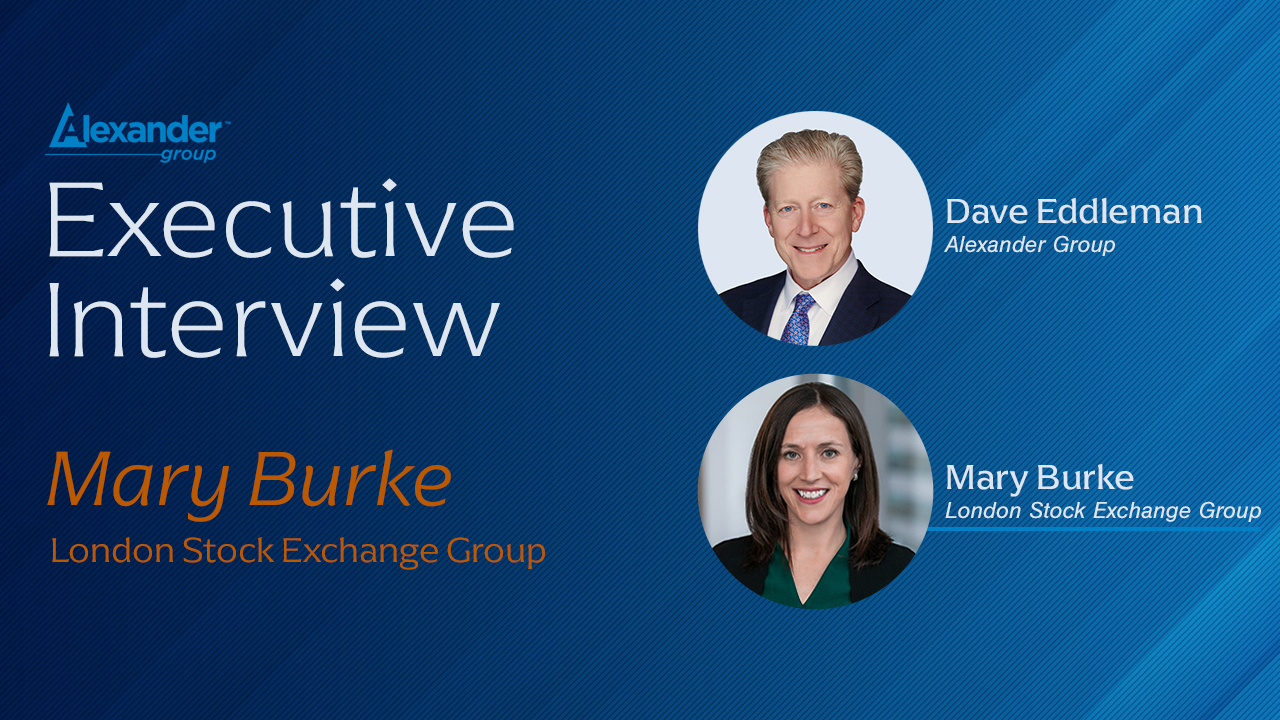Dave Eddleman: Welcome, everybody. I’m Dave Eddleman with the Alexander Group, and I’m here today with Dawnet Beverley, executive vice president, Global Capital Markets with Donnelley Financial Solutions. And we’re here today to talk about some recent trends in financial markets. So, Dawnet, thank you for joining us. First of all, really appreciate your time today. And I guess we could just start off with a first question around general trends in the financial services market. This has been a really tough year, but I don’t think it’s been as tough as a lot of folks thought it would turn out to be nearing the end of 2022. But what if you could just talk in general about the rest of 2022, what’s left of it, and into 2023?
Dawnet Beverley: Great. Thank you, Dave. It’s wonderful to be here. Thanks for having me. Yes, So many trends. Many folks think of us as part of the financial services because that’s who we used to be. It’s who they have associated us with in the past. I’d like to think of us and just reframe it a little bit as the trends that we’re seeing in the financial solutions industry. Because as you know, six years ago we separated and became our own public company and named ourselves DFIN solutions. And a lot has happened. The first big trend, I would say, is just how people view their work. How our employees, many of whom have been long-standing, decades-long even, how they view their role in coming to work. Certainly, with COVID impacting the world as it did, many folks just thought about work differently. And they expected us, the industry, to also think about work differently. So instead of emails and in-person meetings, folks really wanted us to embrace the digital transformation. They wanted to be able to get a text. They wanted to be able to have an app to log on to see where they should show up. They wanted us, the company, to understand how clients were adjusting to the trends, how differently they were working. You and I were talking earlier about real estate, for example. That was often the biggest or the top two biggest cost of every company. Well, we shed real estate. We didn’t need to anymore because no one was gathering in a building. They were on Zoom or on teams. So the whole digital transformation, I think it’s a trend that I believe is going to be continuing.
You heard about SPACs and in 2020 and 2021. Oh, I think some reports say there were over 600 SPACs. Who would have thought during COVID, these special purchase acquisition funds were a way that people could access the capital markets easily to do their deals. Groups of people got their funds together, and then they had money to go find companies to buy. And many, many of them have been hugely, hugely successful. And that was a big reason of a huge financial success in 2020 and in 2021. We could never have predicted that. Now 2022 different story. They have tapered off significantly. And the third trend, which is an exciting one, for me personally and for us at DFIN, is that because strategically we said we were going to be as software company, we were transforming from the financial services to a SaaS business. It helped us because our focus in 2022 was really to make sure that our software products, venue, active disclosure as an example, that was our focus and that we were getting recurring revenues. And I think a lot of companies have realized that software fintech has to be your purpose if you’re going to survive the recession, regardless of when it is, how long it lasts or how many times you go through this. So I hope that helps answer it. In summary, how people view themselves and expected you as the employer to view them right? How technology, the digital transformation that’s just happening worldwide, how that is impacted the work that we’re doing and how our customers expect us to do the work. And then the financial vehicles that emerged, which I call fintech vehicles, frankly, that helped shape us. And here we are.
Dave Eddleman: Yeah, that’s great insight. I mean, as you think about your transition to SaaS to as a service and the proportion of business that’s SaaS versus the more traditional business at DFIN, how does that really affect the planning with under this umbrella of slower growth or anticipated headwinds in 2023?
Dawnet Beverley: So you could see I’m smiling I light up when I have to talk about this. Our CEO who you know Dan Lieb, his executive team and the board made it very, very clear when we became our public company six years ago what our purpose was going to be. You talk to anybody and you say, “what’s your purpose? Our purpose is software.” Everybody knows that. But not only did they say what it was, they enumerated the steps we were going to take once from day one of our company to five years out, seven years out. First, they said very, very clearly, and it was communicated ofte, repeatedly over and over, quarterly talks, monthly talks. I have a weekly call with my team on our weekly calls, everyone communicated this because we wanted to make sure it was clearly embedded and understood we were going to be 44 by 24, which meant, you know, quick, easy slogan 44 by 24. 44% of our revenues would be software by the year 2024. So therefore, it didn’t mean that the rest of our business was not important. It’s still the larger percentage and frankly needed it to boost the investment in the technology so that we could get to our goal of 44 by 24. We’re well on our way. It’s now 2022, almost 2023. And guess what? Of course, that goalpost has moved, so now it’s 66 by 26 or 60. So so, you know, we’re making it very, very clear. So that’s the first thing. Communication, the clarity of it, the repetition of it everywhere you go. And if you look on our website, if you talk to investors, if you listen to any of our investor calls, it’s very, very clear that’s what we’re doing. So that’s one.
Two, communicating is important, but it’s not the only important thing. You have to then align your teams who for decades sold this product and that product and this service. And took pride in the relationships that were cultivated to be able to do an IPO, to do a major M&A transaction, to do a tender offer. You had to tell those people, while I have appreciated it for all these decades that you did it, “Thank you very much. Now I want you to do that. But what’s even more important to me now is that you are able to convert that into selling software, into software. So if you get the IPO, great. We want the IPO. But did you get the virtual data room that preceded the IPO and have you signed up a three-year contract for the active disclosure to manage the client’s compliance for at least three years or two years or five years?” Right. That’s a very, very different message to folks who, quite frankly, some are not able to accept that because you know how software is you know, you could sign a contract and it’s only $100,000 a year. You could do a deal and it’s $1,000,000. Right. So we have had people in our culture for so long who are “I don’t want to sign. I don’t care if it’s three years. I don’t want $300,000. I want to do two deals here. $2 Million.”
Dave Eddleman: Big deal makers. That’s what they do.
Dealmakers, right? So managing the people has been, I would say, our biggest – I’m not going to say challenge, I’m going to say opportunity. Right. Because the people who report directly to the people report to me fall in that category mostly. But it’s really just making them see and be part of the dialogue that this doesn’t mean that you’re no longer relevant or good. It means that I need you to take those amazing relationships that you have nurtured all these decades, and I need you to tell them, “Dave, I want that IPO. But, Dave, you better make sure I’ve gotten that data room. And Dave, I need you to sign up now. Not after the IPO is done, because guess what we have competitors are only focusing on after your IPO is done. So if you’re not closing it and locking in it now, you’re doing us a disservice because frankly, that $150,000 a year for three years is more important to the company and of future and our valuation than this one and done million dollars.”
Dave Eddleman: Totally different mentality as a SaaS salesperson.
Dawnet Beverley: Yes. And so with that comes the culture, because it’s not just about people and the water cooler and you know, it’s about benefits. It’s about your total well-being. It’s about how you end relationships and how you start relationships. It’s how you train, it’s how you develop, it’s how you incorporate inclusion and diversity. It’s your focus on ESG. You know, all of that is culture. And I have been with the company for 32-plus years. And I tell you, it’s just wonderful as a long-standing employee to see that Dan puts his money where his mouth is and the board put their money where their mouths are and everyone is on the train together because everyone is getting the same message and learning. Now there is fear, don’t get me wrong, but there is authenticity. Folks are addressing the fear. You know, I have had to I have worked the hardest in my career in these past few years because you really have to tell someone 57 times the same things. Literally. That’s what you have to do and you have to tell them in different forms. You know, it’s not just the zoom or the teams. You got to meet with them. You got to take them golfing, you got to go to lunch, you got to listen, you got to you know, you really have to meet them where they are because you can’t do it without people.
Dave Eddleman: Right?
Dawnet Beverley: You just can’t. So it’s been exciting, tiring, but exciting.
Dave Eddleman: Well, apart from the people, this investment in enablement, in sales and in marketing and in the post-sales world as well. I mean, you said you put your money out there, put the investment in if we should run into some 2023 headwinds, what’s your view across the board of that sort of investment perspective that says, well, we do have to transition our sales force. And your sales force is no different from a lot of our clients. But it is a different world and it does require investment and it may not be a near-term, in some cases, ROI for the company. So what’s the outlook on that if shareholders begin to put pressure on investments?
Dawnet Beverley: Well, here’s how I’ll answer that. If I were the CEO, there’s one thing I would prioritize above all. And that is the investment in Marketing, specifically sales enablement. Because being a sales leader, I will tell you, for so many decades we were everything. We were doing our marketing. I remember I used to prepare a jumping-out-the-window seminar, the brochures, the advertisement etc, you know, and you just wonder. I mean, I always used to say, God loves Donnelley, why we managed so well for so many decades. Since we became Donnelley Financial Solutions, the way we have been able to position the company as a software company, we could never have done it without the leadership and investment of our sales enablement marketing folks. Search Engine Optimization, as an example. You go figure. We didn’t know we could get leads, you know, or we could sell million-dollar deals or get contracts with recurring revenue without actually knowing a person. We can. I’ve seen it. And it’s easier. It truly is easier. You know, sales reps fear that, okay, it’s going to replace me. It’s not it’s going to enhance your ability and increase your sales. So I’m a huge proponent of that. And short-term or long-term, that’s the area that we absolutely must invest in. Because you have to invest, you know, you just have to do that. Now, how you feed that investment is a dialogue around what do you pull up your straps on?
Dave Eddleman: Right. What are the exact initiatives you want to put the investment in?
Dawnet Beverley: Right. You know, and if your purpose is clear, the answer is kind of clear. You know, does this move towards your goal of becoming a holy what we say we’re going to do in software? If it does, then you have to do it. If it doesn’t, then you don’t. It might be a great idea, but you don’t. I mean, I’m dealing with some situations now where someone wanted a contract to do something, and I said, What’s the value? And he said, Oh, it’s about $4 million. And at first I thought, Hmm, $4 million. That’s a lot. I said, I’m glad I didn’t say, Ok, sure. I copied my boss and I said, We’ll get back to you. My boss sent me a note and he says, $4,000,000 9% margins. No, we don’t want that.
Dave Eddleman: Turned it away.
Dawnet Beverley: Yeah, right. So those are the decisions you need to make because it will take resources. And resources are costs and time and money to service that business, but that business does not align with our purpose. So the answer is no. So it’s easy.
Dave Eddleman: Interesting. Well, this has been really great insight and I really appreciate your time and thinking about your transition, thinking about this unsure marketplace in 2023. And thanks again. Really appreciate it.
Dawnet Beverley: It’s my pleasure. Thank you, Dave.





